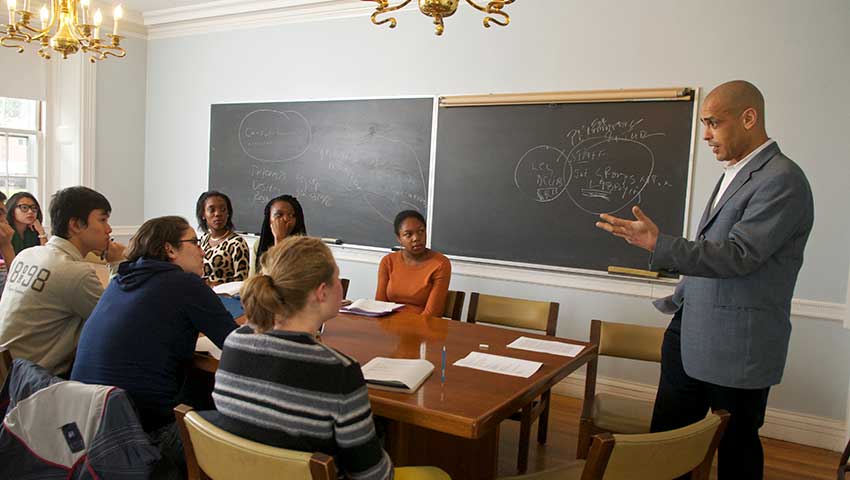In a March 12, 2018, letter to the community, President Biddy Martin wrote with great sadness to share news of the passing of Jeffrey B. Ferguson, the Karen and Brian Conway '80, P'18 Presidential Teaching Professor of Black Studies. The text of her letter follows.
We invite members of the Amherst College community to leave notes and remembrances by logging in and clicking “Add comment” below.
Image

Dear Faculty, Staff, and Students,
I write with great sadness to let you know that our colleague, Jeffrey Ferguson, died last night after battling cancer for several years. Jeff, the Karen and Brian Conway '80, P'18 Presidential Teaching Professor of Black Studies, was a remarkable intellectual, an innovative teacher, and a wonderful human being. I feel fortunate to have been his friend, one of many who benefited in immeasurable ways from his bold thinking, his warmth, his kindness, his sense of humor, and what can only be called his grace. As recently as this past Friday evening, I had the chance to speak with him, to hear his distinctive laugh, and to sense his determination to persist in his thinking, loving, and living.
Among many other achievements and contributions to Amherst, Jeff designed the curriculum in Black Studies that has benefited so many Amherst students. It was based on his commitment to providing students with a passion for learning and was constructed to offer students the essential transferable intellectual capacities that lie beneath the content of a course—close reading, persuasive writing, argumentation, and research. He believed it was important not only for students to acquire those abilities, but also to be aware of what they are gaining and cognizant of their own intellectual growth. Jeff was persuaded that students gain confidence from understanding and being able to name what they are learning to do. They benefit from seeing that these abilities are relevant to all parts of the curriculum and from experiencing the joy that learning can bring to their lives as thinking and feeling beings. He was committed to students’ success and knew from his own life experience what a great education can do to change individual lives and address societal ills.
Jeff was a scholar of Black Studies and American Studies. He is the author of an important study of the Harlem Renaissance,The Sage of Sugar Hill: George S. Schuyler and the Harlem Renaissance and of a volume for use in classrooms, entitled The Harlem Renaissance: A Brief History with Documents. He is also author of a number of essays that have been celebrated not only for their distinctive scholarly contributions, but also for their unique and elegant style. Jeff has been working on a book-length study of the theme of resistance in African-American discourse, one that questions the notion that resistance, as often understood, inevitably and only serves the cause of liberation. With Werner Sollers he was also working on a Norton Anthology of American literature that shows how interrelated black and white American literary traditions are.
Jeff taught canonic black writers and thinkers as he instilled in students fundamental intellectual abilities and passion. I would have loved to have taken his courses as a student. I remember the student in my office hour who talked for nearly an entire half hour about what he was learning in Jeff’s course on Ellison’s Invisible Man and I still recall the day a student visited my office hours having just come from Jeff’s “Critical Debates in Black Studies.” She had argued a perspective on affirmative action that was not her own position, but the one that she had been assigned in his course on argumentation. She offered that preparing and then arguing the case against race-based admission as persuasively as she could allowed her to see that there could be good faith and legitimacy in the opposing view.
Even as he fought the cancer that took him from us, Jeff contributed to early discussions among members of the curriculum committee—the committee that will present its recommendations this Spring. With funding from the Andrew W. Mellon Foundation, he shared valuable insights into teaching with a number of faculty colleagues interested in building courses that made critical, transferable intellectual skills the focus of their curricular and pedagogical work.
Jeff was a deep and independent thinker. I loved listening to him talk about his scholarly interests, his views on race, racism, and American culture, and his thinking about resistance. I enjoyed talking with him about virtually anything. Talking with Jeff was always a source of deep pleasure. The courage, curiosity, and understanding with which he faced and discussed his illness amazed me, and it stimulated my interest in the medical advances he described and in the other approaches to health and healing that he had adopted long ago. I was often buoyed by his evident love of life and the gratitude he felt for the life he had, for his family, his friends, and his work.
Friends and admirers are establishing a teaching award in Jeff’s honor and in his name at Amherst and are also making plans for a symposium in his honor. When Catherine Epstein and I have more concrete information about these ways of celebrating him, we will make sure you are informed and invited to take part.
In the meantime, we hold Jeff’s wife Agustina, their twin boys, Jeff’s mother, and all those who loved him in our hearts.
Loading the player...
A memorial service was held on Sunday, May 6, 2018.